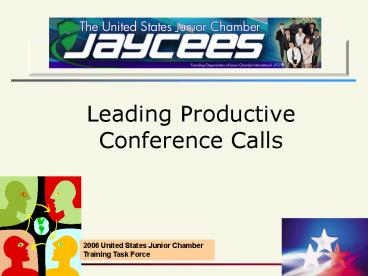Leading Productive Conference Calls - PowerPoint PPT Presentation
1 / 18
Title:
Leading Productive Conference Calls
Description:
Deadly Sins. Leading the Call. 8/11/09. 4. Preparation. Purposes of the ... The Deadly Sins. Poor Timing. Lack of Focus. Side Conversations. Lack of Control ... – PowerPoint PPT presentation
Number of Views:27
Avg rating:3.0/5.0
Title: Leading Productive Conference Calls
1
- Leading Productive Conference Calls
2006 United States Junior Chamber
Training Task Force
2
The 40k Foot View
- Meetings, Meetings, Meetings
- Components of Successful Tele-Meetings
- What distinguishes a live meeting from a
conference call - Meetings ARE the Work!
- Bad Meetings Make Bad Companies.
- Bill Daniels
- American Consulting Training
3
Pieces of the Puzzle
- Preparation
- Leaders Role
- Participants Role
- Leading the Call
- Review and Questions
- Follow-Up
- The Deadly Sins
4
Preparation
- Purposes of the Call
- Organization
- Timing
- Agenda
- Beforehand
5
Purposes of the Call
This delivery might best be in written form by
e-mail or memo or letter. Things that need to be
discussed or clarified for specific impact on
changes are the prerequisite thought.
- Informational
- Regularly Scheduled
- Project Planning
- Consciousness Raising, Self Awareness,
Brainstorming - Teaching (Topics and/or Skills)
- Relationship Building
This could be used for new members of a team of
work group, perhaps even for a process change
that is proving difficult and you want to make
sure all those involved are working well together
6
Organization
- Information
- Materials
- Key Team Members
- Resources
- Answers
Organize information and your materials!
Who do you need in the meeting? Where might the
discussion
lead and who would be crucial to keep the
discussion moving?
Do you need every one in every
meeting? Too many
may be as disastrous
as too few.
What questions can you imagine might be asked?
Are you ready with your answers? What resources
do you need?
7
Timing
- Time Zones
- Commitments
- Energy Levels
- Time Keepers
- Obey the Clock
8
Agenda
Timing
Purpose
Participants
Overall Outcome
Supportive Material
Major Topics
Activities
9
Beforehand
- Gather all Information
- Send Agenda (24-72 hours in
advance) - Invite Timekeeper
- Invite Note Keeper
- Check Facilities and Conference Numbers
- Review all Documents
10
Leaders Role Start out Right
- Start On Time
- Welcome and Show Appreciation
- Controlled Roll-Call
- Sky View of Purpose
- Roles
- Team Agreements
Start out Right
11
Leaders Role During the Call
- Be a Model
- Get People Involved
- Handle Conflict
- Control the Call
- Parking Lot well review that later
- Stay on Track Time and Topic
- Provide Summary
- Provide Follow-Up
12
Participants Role
- Make it Important
- Offer Suggestions
- Listen
- What to Guard Against
Multitasking or focusing only on our part of
the agenda, which can contribute to missed
communication and opportunities as well as lead
to rework, impacting our results and the bottom
line.
13
Review
- Main Points
- Tasks and Assignments
- Next Steps
Make sure everyone is on the same page and has
the same understanding of next steps. You are
relying of voice only during a conference call so
a careful review is a must.
14
Questions
- Make Time for Questions
- Include Time into Agenda
- Check Parking Lot items which you moved during
earlier discussion. - Follow-up Unanswered Questions
- Bounce Challenging Questions
15
Follow-Up
- Summary
- Main Points Discussed
- Items Not Discussed/Addressed
- Next Steps/Tasks/Assignments
- Conclusions/Decisions/Questions
- Thanks
16
The Deadly Sins
- Poor Timing
- Lack of Focus
- Side Conversations
- Lack of Control
- Missing Information
- Poor Follow-Up
17
Where to Get More Information
- Books
- Running a Meeting That Works (Business Success
Series)by Robert F. Miller, Marilyn Pincus - How to Make Meetings Work
by
Michael Doyle, David Straus - How to Hold Successful Meeting 30 Action Tips
for Managing Effective Meetings (30-Minute
Solutions Series)
by Paul R. Timm - First Aid for Meetings Quick Fixes and Major
Repairs for Running Effective Meetings
by Charlie Hawkins - Great Meetings! How to Facilitate Like a Pro
by Dee Kelsey, et al
18
- Leading Productive Conference Calls
2006 United States Junior Chamber
Training Task Force































